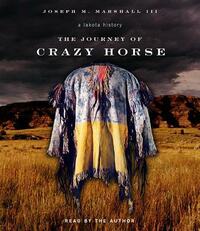Take a photo of a barcode or cover
This story is told, with the exception of a few explanatory passages, entirely in the Lakota voice. "Surely, if enough white men are killed, they will go away" is not followed by "but of course, this was not to be the case." Only the first sentence is there. The reader must then insert the second one himself. It makes for a different narrative than, say, Bury My Heart at Wounded Knee, which I also enjoyed. Indeed you will find the same people in both: Crazy Horse, Red Cloud, Spotted Tail, Sitting Bull. This time, however, you are given the life of Crazy Horse from birth to death, with the other names coming in to help explain his story. This is not the story of Native Americans or even the Lakota tribe. It is the story of an ordinary man, in many respects, who took it upon himself to save an entire tribe (and fail).
Through it, though, and especially having read Bury My Heart, you will get the story of the white/American push westward, and what bastards they were. It's the one period in our history when I will root against the US Army.
It does not sugarcoat or haze the lens when looking at either side. The book notes matter-of-factly that at one time, Crazy Horse set out to kill every single white person he came across: soldiers, miners, and their families. You also see the Lakotah repeatedly attack the Crow and other people who should have, in the face of this epoch-ending threat, become allies. The Army, which has been painted as the bad guys before, is largely painted as bad guys again. Crazy Horse adapted the Army's method of total war at the time: Don't just kill the warriors, kill their wives, children, and parents. He saw it as the only way, eventually, to rid the land of the invaders, and that the Lakotah way of fighting warrior-to-warrior, and then letting your skills and merits decide the outcome and "defeat" the enemy, did not work. Attacking and then letting the remaining force retreat did not mark you as a great man, it marked you as weak (as he saw it). You had to exterminate.
I also saw in Lakotah culture that warriors, or those who wish to be considered warriors, are the same everywhere. One can easily draw parallels to American urban gangs throughout history, or smaller fighting forces, especially insurgents, globally. This is not to ascribe value or blame to any of them, just noting the similarities.
Through it, though, and especially having read Bury My Heart, you will get the story of the white/American push westward, and what bastards they were. It's the one period in our history when I will root against the US Army.
It does not sugarcoat or haze the lens when looking at either side. The book notes matter-of-factly that at one time, Crazy Horse set out to kill every single white person he came across: soldiers, miners, and their families. You also see the Lakotah repeatedly attack the Crow and other people who should have, in the face of this epoch-ending threat, become allies. The Army, which has been painted as the bad guys before, is largely painted as bad guys again. Crazy Horse adapted the Army's method of total war at the time: Don't just kill the warriors, kill their wives, children, and parents. He saw it as the only way, eventually, to rid the land of the invaders, and that the Lakotah way of fighting warrior-to-warrior, and then letting your skills and merits decide the outcome and "defeat" the enemy, did not work. Attacking and then letting the remaining force retreat did not mark you as a great man, it marked you as weak (as he saw it). You had to exterminate.
I also saw in Lakotah culture that warriors, or those who wish to be considered warriors, are the same everywhere. One can easily draw parallels to American urban gangs throughout history, or smaller fighting forces, especially insurgents, globally. This is not to ascribe value or blame to any of them, just noting the similarities.
This is an absolute must-listen if you have ANY interest in the American West, history in general, or the story of American Indians. Marshall is an outstanding narrator and the cultural context of Crazy Horse changes everything you thought you knew about the Greasy Grass Fight, as well as the real reasons that his character is still revered by the Lakota Sioux.
At first, I wasn't sure I was going to enjoy listening to the author read this book. The author's voice is slow, but as I listened, it came to feel like the rhythm of an oral tradition storytelling. The author's personal connection to the story as a Lakota himself and his access to oral stories about Crazy Horse made this a very interesting description not only of Crazy Horse but also of the Lakota people of the late 1800s. I very much enjoyed hearing about the social traditions and the daily lives of these people who were so badly mistreated by the conquering whites.

